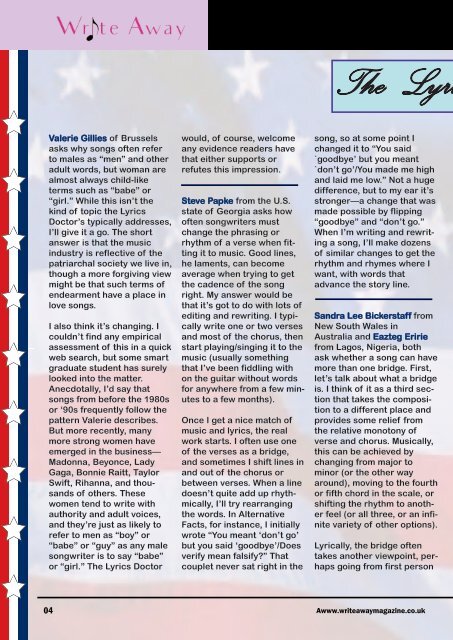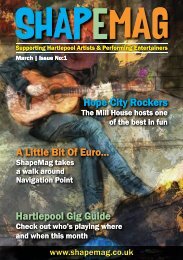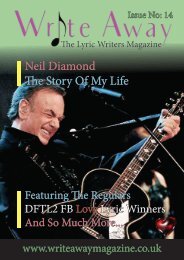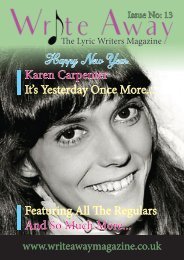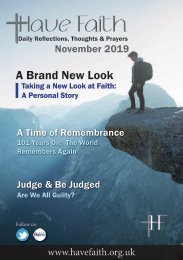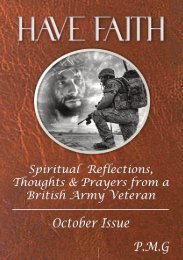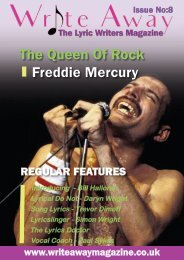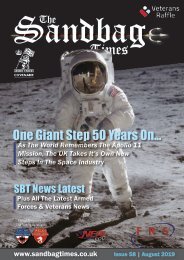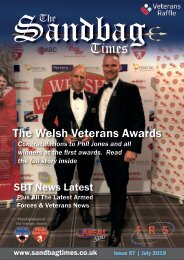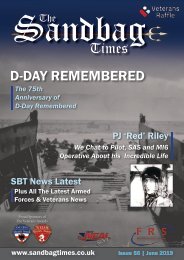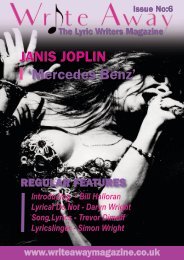Write Away Magazine - July Edition
The Lyric writers magazine
The Lyric writers magazine
- No tags were found...
You also want an ePaper? Increase the reach of your titles
YUMPU automatically turns print PDFs into web optimized ePapers that Google loves.
The Lyri<br />
Valerie Gillies of Brussels<br />
asks why songs often refer<br />
to males as “men” and other<br />
adult words, but woman are<br />
almost always child-like<br />
terms such as “babe” or<br />
“girl.” While this isn’t the<br />
kind of topic the Lyrics<br />
Doctor’s typically addresses,<br />
I’ll give it a go. The short<br />
answer is that the music<br />
industry is reflective of the<br />
patriarchal society we live in,<br />
though a more forgiving view<br />
might be that such terms of<br />
endearment have a place in<br />
love songs.<br />
I also think it’s changing. I<br />
couldn’t find any empirical<br />
assessment of this in a quick<br />
web search, but some smart<br />
graduate student has surely<br />
looked into the matter.<br />
Anecdotally, I’d say that<br />
songs from before the 1980s<br />
or ‘90s frequently follow the<br />
pattern Valerie describes.<br />
But more recently, many<br />
more strong women have<br />
emerged in the business—<br />
Madonna, Beyonce, Lady<br />
Gaga, Bonnie Raitt, Taylor<br />
Swift, Rihanna, and thousands<br />
of others. These<br />
women tend to write with<br />
authority and adult voices,<br />
and they’re just as likely to<br />
refer to men as “boy” or<br />
“babe” or “guy” as any male<br />
songwriter is to say “babe”<br />
or “girl.” The Lyrics Doctor<br />
would, of course, welcome<br />
any evidence readers have<br />
that either supports or<br />
refutes this impression.<br />
Steve Papke from the U.S.<br />
state of Georgia asks how<br />
often songwriters must<br />
change the phrasing or<br />
rhythm of a verse when fitting<br />
it to music. Good lines,<br />
he laments, can become<br />
average when trying to get<br />
the cadence of the song<br />
right. My answer would be<br />
that it’s got to do with lots of<br />
editing and rewriting. I typically<br />
write one or two verses<br />
and most of the chorus, then<br />
start playing/singing it to the<br />
music (usually something<br />
that I’ve been fiddling with<br />
on the guitar without words<br />
for anywhere from a few minutes<br />
to a few months).<br />
Once I get a nice match of<br />
music and lyrics, the real<br />
work starts. I often use one<br />
of the verses as a bridge,<br />
and sometimes I shift lines in<br />
and out of the chorus or<br />
between verses. When a line<br />
doesn’t quite add up rhythmically,<br />
I’ll try rearranging<br />
the words. In Alternative<br />
Facts, for instance, I initially<br />
wrote “You meant ‘don’t go’<br />
but you said ‘goodbye’/Does<br />
verify mean falsify?” That<br />
couplet never sat right in the<br />
song, so at some point I<br />
changed it to “You said<br />
`goodbye’ but you meant<br />
`don’t go’/You made me high<br />
and laid me low.” Not a huge<br />
difference, but to my ear it’s<br />
stronger—a change that was<br />
made possible by flipping<br />
“goodbye” and “don’t go.”<br />
When I’m writing and rewriting<br />
a song, I’ll make dozens<br />
of similar changes to get the<br />
rhythm and rhymes where I<br />
want, with words that<br />
advance the story line.<br />
Sandra Lee Bickerstaff from<br />
New South Wales in<br />
Australia and Eazteg Eririe<br />
from Lagos, Nigeria, both<br />
ask whether a song can have<br />
more than one bridge. First,<br />
let’s talk about what a bridge<br />
is. I think of it as a third section<br />
that takes the composition<br />
to a different place and<br />
provides some relief from<br />
the relative monotony of<br />
verse and chorus. Musically,<br />
this can be achieved by<br />
changing from major to<br />
minor (or the other way<br />
around), moving to the fourth<br />
or fifth chord in the scale, or<br />
shifting the rhythm to another<br />
feel (or all three, or an infinite<br />
variety of other options).<br />
Lyrically, the bridge often<br />
takes another viewpoint, perhaps<br />
going from first person<br />
04 Awww.writeawaymagazine.co.uk


